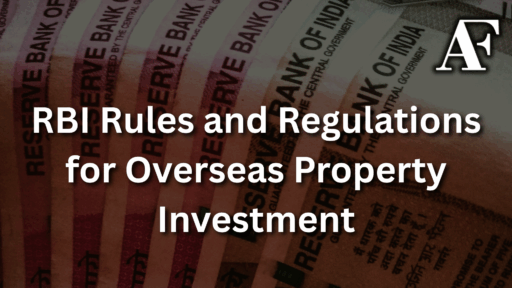Indian residents can legally purchase property abroad using the Liberalised Remittance Scheme (LRS).
This permits remittances up to USD 250,000 per financial year for capital account transactions, including immovable property acquisition.
This guide consists of several important aspects of purchasing property abroad under LRS, such as:
- Can Indians buy property in other countries?
- What is the LRS for Buying Property Overseas?
- How to declare overseas property?
Furthermore, all the essential rules and regulations regarding Reserve Bank of India (RBI), Foreign Exchange Management Act (FEMA), and LRS for buying overseas property are also provided.
My contact details are hello@adamfayed.com and WhatsApp +44-7393-450-837 if you have any questions.
The information in this article is for general guidance only. It does not constitute financial, legal, or tax advice, and is not a recommendation or solicitation to invest. Some facts may have changed since the time of writing.

What is the LRS for Foreign Investment?
The Liberalised Remittance Scheme (LRS) is a comprehensive facility introduced by the RBI that allows resident individuals to freely remit foreign exchange abroad for permitted purposes without seeking prior RBI approval.
Implemented in 2004, the scheme has evolved to facilitate various overseas financial activities while maintaining regulatory oversight.
For property investments, this scheme serves as the primary mechanism for legal fund transfer, allowing individuals to diversify their investment portfolios internationally
The scheme covers various investment purposes, including:
- Equity investments
- Mutual fund purchases
- Opening foreign bank accounts
- And crucially, acquiring immovable property abroad
The scheme operates on a financial year basis (April to March), and the limit resets annually, allowing consistent overseas investment opportunities.
Recent updates in 2025 have modified the Tax Collected at Source (TCS) thresholds, with exemptions up to INR 10 lakh and category-wise TCS rates for different purposes.
Can You Buy Property Abroad Using the Liberalised Remittance Scheme?
Yes, Indian residents can legally buy property outside India, subject to specific regulations and compliance requirements under FEMA.
The primary avenue for such acquisitions is the Liberalised Remittance Scheme, which provides a structured framework for overseas property investments.
Resident individuals are permitted to acquire immovable property outside India through several legitimate channels.
The regulations ensure that such acquisitions comply with foreign exchange laws while providing flexibility for legitimate property investments.
Can an Individual Remit Funds for Acquiring Immovable Property Abroad under LRS?
As per LRS, individuals may remit up to the prescribed limit for property purchases, subject to banking and documentation compliance.
Family pooling is permitted.
What are the RBI Rules for Investing in Overseas Immovable Property?
The RBI has established specific rules governing overseas immovable property investments under the Foreign Exchange Management (Overseas Investment) Rules, 2022.

Resident individuals may acquire immovable property outside India through multiple permitted routes.
The primary method involves remitting funds under LRS, which can be used for purchasing residential or commercial properties abroad.
The regulations specify that property acquisition must comply with local laws of the country where the property is located.
Individuals must ensure that the purchase process follows established banking channels and maintains proper documentation for regulatory compliance.
The rules also permit individuals to create charges on overseas property in accordance with FEMA provisions, provided such arrangements comply with applicable guidelines.
These rules replaced the earlier FEM (Acquisition and Transfer of Immovable Property Outside India) Regulations, 2015.
What is the RBI Permission for Foreign Remittance?
RBI permission requirements vary based on the nature and amount of foreign remittance.
- For property purchases within the LRS limit, no specific RBI approval is required, as the scheme provides general permission for such transactions.
- Remittances exceeding this limit or involving certain restricted countries require special RBI permission.
- Authorised dealers (banks) facilitate foreign remittances under established guidelines, ensuring compliance with regulatory requirements. These institutions verify the purpose of remittance, documentation completeness, and adherence to prescribed limits before processing transactions.
- Banks also collect Tax Collected at Source (TCS) as per revised rates effective from April 2025, with different slabs for various remittance purposes.
- For property purchases in specific countries like Pakistan, Bangladesh, North Korea, and Iran, prior RBI approval is mandatory regardless of the amount.
The central bank evaluates such applications based on security considerations and bilateral relationships, ensuring that overseas investments align with national interests.
What is the Limit of Overseas Investment in Immovable Properties?
Individual residents face an annual limit of USD 250,000 for overseas immovable property investments under LRS.
This cap applies to the aggregate of all overseas remittances in a financial year, including property purchases, investments, and other capital account transactions.
The individual limit resets each financial year, allowing consistent investment opportunities for qualifying individuals.
Families can effectively pool their LRS limits to make larger property investments.
A family of four can jointly transfer up to USD 1 million annually for property purchases, provided all members are co-owners of the investment and comply with LRS conditions.
This arrangement enables families to acquire higher-value properties while maintaining regulatory compliance.
Individuals seeking to invest beyond LRS limits must obtain specific RBI permission.
The central bank evaluates such applications based on the purpose of investment, source of funds, and compliance with overseas investment guidelines.
Sequential remittances at the end of one financial year and the beginning of the next can also facilitate investments up to USD 500,000 within a short period.
How Much Can an Indian Company Invest Abroad in Immovable Properties?
Indian companies face different regulations for overseas immovable property investments compared to individuals.
Under the Foreign Exchange Management (Overseas Investment) Rules, 2022, companies can make overseas direct investments up to 400% of their net worth or USD 1 billion per year, whichever is lower.
However, direct investment in foreign entities engaged in the real estate business is prohibited without specific RBI approval.
This restriction means that Indian companies cannot invest in foreign companies whose primary business involves buying and selling real estate or trading in Transferable Development Rights (TDRs).
Indian entities with overseas offices are permitted to acquire immovable property abroad for business purposes and staff residential requirements.
Such acquisitions must be proportionate to the company’s operations and comply with prescribed reporting requirements.
Companies must demonstrate legitimate business needs for such property investments and maintain proper documentation for regulatory scrutiny.
FEMA Overseas Investment Rules: What is Immovable Property under FEMA?
Immovable property under FEMA encompasses land, buildings, and any structure permanently attached to the earth. The definition includes residential properties, commercial buildings, agricultural land, and any rights or interests in such properties.

FEMA regulations distinguish between different types of immovable property based on their location, ownership, and the residency status of the owner.
For overseas property investments, FEMA treats immovable property as a capital asset that alters the asset base of resident Indians.
Such acquisitions create foreign assets that must be declared on income tax returns and comply with overseas investment regulations.
The regulatory framework ensures that property investments abroad contribute to legitimate wealth diversification while maintaining transparency.
The definition excludes leasehold rights not exceeding five years, which are treated differently under FEMA regulations.
Short-term lease arrangements do not require the same level of regulatory compliance as permanent property ownership, reflecting the temporary nature of such arrangements.
What is Section 4 of FEMA?
Section 4 of the Foreign Exchange Management Act, 1999 (FEMA) says that a person resident in India cannot buy, hold, own, or transfer any foreign currency, foreign security, or property abroad unless it is done according to FEMA rules or RBI guidelines.
In short, this section makes overseas property ownership by Indians a regulated activity, requiring compliance with RBI permissions and procedures.
It ensures that such acquisitions happen only through legal channels and for legitimate purposes.
What is Rule 9 of the OI Rules?
Rule 9 of the Overseas Investment Rules, 2022, lays down the conditions under which resident individuals and Indian entities can invest abroad.
For individuals, Schedule III applies, which allows overseas investments (including property) through the Liberalised Remittance Scheme (LRS) and other permitted modes.
For companies and firms, Rule 9 ensures that investments abroad follow pricing, reporting, and compliance guidelines.
In simple terms, Rule 9 ensures that both individuals and businesses invest overseas in a structured and transparent manner.
What is Rule 21 of the OI Rules?
Rule 21 specifically deals with immovable property abroad. It prohibits residents in India from acquiring or transferring property outside India unless it falls under permitted categories or has RBI approval.
The rule allows certain exceptions, such as:
- Property acquired before July 8, 1947, or with RBI approval.
- Property inherited or received as a gift from an eligible person.
- Property bought with funds remitted under LRS or from a Resident Foreign Currency (RFC) account.
- Properties on lease for up to five years.
- Joint ownership with non-resident relatives.
This rule provides flexibility for genuine cases while keeping overall regulatory control with the RBI.
Other Important Rules for Overseas Investment in Immovable Properties
- Remittance of Assets Regulations, 2016: Allows up to USD 1 million a year to be repatriated from overseas property sales by eligible individuals.
- Master Directions (RBI): Require reporting and record-keeping of foreign property investments.
- Non-Debt Instruments Rules, 2019: Clarify ownership and inheritance rights for PIOs and OCIs.
- Tax Collected at Source (TCS): Overseas remittances (including for property) attract TCS at varying rates, revised from April 2025.
Declaring Foreign Property: Can a Person Resident in India Hold Property Outside India?
Yes. Residents in India can hold property abroad if it is acquired through permitted means such as LRS remittances, inheritance, gifts, or RFC account funds.

Properties acquired before specific cut-off dates or with RBI approval also remain valid.
However, ownership must comply with FEMA rules, disclosure norms, and tax obligations.
How to Declare Foreign Assets in India?
Residents classified as Resident and Ordinarily Resident (ROR) must declare foreign assets in Schedule FA of their ITR.
For property, details like address, cost, ownership share, and income must be reported.
Rental income or capital gains from overseas property are disclosed separately in Schedule FSI.
Correct reporting ensures compliance with the Black Money Act, 2015 and avoids penalties.
What are Undisclosed Assets Located Outside India?
Undisclosed assets are foreign properties, accounts, or investments not reported in tax returns.
The Black Money Act, 2015, imposes a flat 30% tax on such assets, plus heavy penalties (up to ₹10 lakh) and possible imprisonment.
Small foreign assets (other than immovable property) below ₹20 lakh may be exempt from penalty, but not from disclosure.
Is it Mandatory to Disclose Foreign Assets in India?
Yes. All ROR taxpayers must disclose foreign assets, whether or not they earn income from them.
This includes bank accounts, property, shares, deposits, and loans abroad. Non-disclosure attracts penalties up to ₹10 lakh and jail up to seven years.
NRIs and RNORs are exempt, but residents at the time of acquiring such assets may still have disclosure duties later.
Conclusion
The Liberalised Remittance Scheme (LRS) allows Indian residents to invest in property abroad within the USD 250,000 annual limit, provided they follow proper banking and documentation procedures.
Understanding FEMA rules and tax compliance is key to avoiding legal issues.
Investors should stay updated on changes in TCS rates, disclosure rules, and reporting requirements, as transparency is a major focus of the government.
With proper planning, guidance, and adherence to regulations, Indians can diversify their wealth internationally while remaining compliant with the law.
FAQs
Can Indians buy property in other countries?
Yes. Indians can buy property abroad under the Liberalised Remittance Scheme (LRS).
Purchases must be routed through authorized dealers (banks), with proper documentation and compliance with both FEMA and local laws.
However, buying property in certain countries requires prior RBI approval.
Is purchasing property overseas a capital account transaction?
Yes. Buying property abroad is treated as a capital account transaction under FEMA because it creates a foreign asset for the Indian resident.
Capital account transactions are generally prohibited unless specifically permitted, and LRS provides that permission within prescribed limits.
Such transactions must be disclosed in the income tax return under foreign assets, and income from the property is taxable in India, with relief available under Double Taxation Avoidance Agreements (DTAAs).
What are the prohibited transactions under FEMA?
FEMA restricts or prohibits:
-Investment in foreign entities engaged in real estate trading or speculative activities.
-Investments in Pakistan, Bangladesh, North Korea, and Iran without prior RBI approval.
-Deferred payment arrangements for property purchases (payments must go through authorized banking channels upfront).
-Investment in prohibited businesses like chit funds, Nidhi companies, agricultural/plantation activities, or entities involved in real estate speculation.
These rules ensure that overseas investments are legitimate, transparent, and compliant with India’s foreign exchange regulations.
What is the Relief for Indians Buying Assets Abroad?
The main relief is the LRS scheme, which allows remittances up to USD 250,000 per person per year without RBI approval.
Families can pool their limits for bigger investments. DTAAs prevent double taxation on income from foreign property.
Inheritance and gift provisions also permit ownership without fresh remittance, making cross-border wealth transfers smoother.
Pained by financial indecision?

Adam is an internationally recognised author on financial matters with over 830million answer views on Quora, a widely sold book on Amazon, and a contributor on Forbes.



